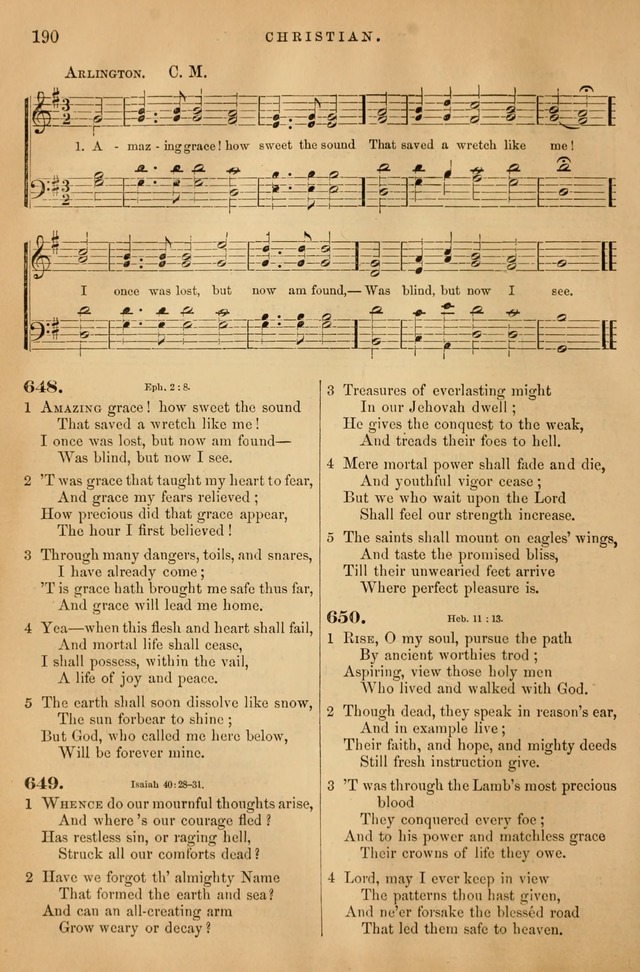Blog
M. W. Bassford
In Praise of Hymns with Verses
Wednesday, March 03, 2021
For the past 40 years or so, the landscape of American sacred music has been dominated by the so-called “worship wars”. These (thankfully bloodless) conflicts have arisen between proponents of rhymed, metered traditional hymns and supporters of freer-form contemporary praise songs. No doctrinal issues are directly at stake here; instead, this is a question of expedience. Which form is most useful for edifying the congregation?
The a-cappella practice of the churches of Christ adds another dimension to the discussion. Most denominational churches have a performer-audience model of worship, and this model doesn’t change whether the performer is using an organ or a guitar.
Within the Lord’s church, though, we use a leader-participant model. We rely on the singing of ordinary Christians, and this reliance means that the opportunities and challenges before us differ from those before denominational worship ministers. The solutions that work for them won’t necessarily work for us, and aspects of worship music that don’t matter to them may well be vital for us.
In turn, this means that we should hesitate to abandon the form of the traditional hymn. The rhymed, metered verse was not invented by Isaac Watts; rather, it is an adaptation of rhymed, metered folk song. All across Western folk music, from sea chanteys to French ballads to medieval Christmas carols, ordinary people have been singing in rhyme and meter for centuries, not because anybody made them, but because it is the form that has evolved to best facilitate the singing of ordinary people. If we also are trying to get ordinary people to sing, we ought to pay attention.
Upon examination, several traits of rhymed, metered, versed hymns commend themselves to our attention. First, they are economical in their use of music. Consider the hymn “O Thou Fount of Every Blessing”. Everyone (including us) sings it to the hymn tune NETTLETON.
NETTLETON is written in rounded-bar form, which many hymn tunes use. A rounded-bar tune consists of four phrases of music with an AABA pattern. Thus, the first, second, and fourth phrases are identical. It’s musically repetitive.
Further repetition arises through the use of multiple verses, as different lyrics are sung to the same music. Thus, by the time a congregation has sung three verses of “O Thou Fount”, it has sung the B phrase three times and the A phrase a whopping nine times.
Musicians often don’t like rounded-bar tunes. They’re bored by them. You sing the same thing over and over and over again. Yawn.
However, what seems like a stumbling block to the musician is a blessing to the congregation. Every church contains a contingent of people who complain about singing “too many new hymns” and an even larger contingent of those who feel the same way but choose to suffer in silence.
Really, though, such brethren don’t object to the new song. They object to the new tune, and they are objecting because they are not particularly musically skilled, can’t read music, and only sing in public when God commands them to. The first time a hymn is sung, they are at a loss, and they can only learn the tune slowly and painfully, by rote. Most people in most congregations fall into this category.
For decades, I’ve heard grumblings from skilled singers that these Christians need to get with the program and learn to read music. I think that solution runs in the wrong direction. Rather, we need to take account of our brethren and introduce new songs that meet them where they are. Because traditional hymns incorporate such a large amount of musical repetition, they do this well. They offer non-musicians the opportunity to sing a great deal of new content while not demanding much from them musically.
The flip side of the coin here is that while versed hymns are repetitive musically, they have the potential to be lyrically rich. The typical praise song is lyrically repetitive. Some hymns are too (and repetition to a certain extent is spiritually useful), but others work their way logically through a subject, like an essay in verse.
Take, for instance, “Amazing Grace”. The logical structure of the hymn is so strong that we could outline the five verses that usually appear in our hymnals as follows:
- God’s grace is amazing!
- I thought it was amazing when I first believed.
- It has brought me this far in life, and it will continue to protect me.
- It will keep me safe till the end of my life.
- I will celebrate God’s grace forever in heaven.
Hymns with such thoughtful, structured content are important for two reasons. First, they teach a great deal, which amply fulfills the divine commandment to teach and admonish in song. Second, they accustom us to following complex arguments.
It’s fashionable these days to complain about proof-texting by brethren during Bible study. Certainly, proof-texting has its uses (otherwise inspired authors would not have proof-texted), but the Bible is more than a series of proof texts. When we learn to comprehend entire arguments in the Scripture rather than focusing on isolated verses, we grow greatly in our understanding.
When we sing and pay attention to the words of a structured, content-rich hymn, we necessarily also improve our capacity for understanding the word of God. Conversely, when we sing only repetitive praise hymns that contain no more than a single verse’s worth of content, our ability to appreciate the Bible remains stunted. Our thoughtfulness in worship and our thoughtfulness in study cannot be separated.
The worship wars are not going to be settled anytime soon, and a complete victory for either side isn’t even desirable. There’s a place for contemporary praise songs in our worship services. So too, though, there ought to be a place for traditional hymns. Indeed, the more we return to these ancient forms, the more we will benefit from the wisdom behind them.
This article originally appeared in the February issue of Pressing On.
Jeremiah 29:11 in Context
Tuesday, March 02, 2021
If there is any passage that has attracted our country’s attention for the past five years or so, it is Jeremiah 29:11. I can’t count the number of times I’ve seen a meme on Facebook that says, “’For I know the plans I have for you,’ declares the Lord.” Jeremiah 29:11 is everywhere, from coffee mugs to T-shirts.
Now, I’m certainly not opposed to the quoting of any Bible passage, but the sad truth is that this one frequently is misapplied by the quoters. When we look at the isolated verse, it is so vague—talking about plans, a future, and a hope—that it could mean nearly anything. Not surprisingly, the way that people use it often says much more about their plans for themselves than about God’s plans for them.
However, I’ve also seen people react to the memeification of this verse by denying that it has any applicability to us whatsoever: “If you weren’t alive in 583 BC, this verse is not for you!” I don’t think that’s right either. This morning, then, I’d like to find a middle ground by considering Jeremiah 29:11 in context.
Even with a limited view of context, looking only at the few verses immediately around the passage, several deeply significant spiritual lessons emerge. The first of these is that SIN HAS CONSEQUENCES. We see this laid out in Jeremiah 29:10. God tells the Jews that he is going to restore them to the promised land—but only after they spend 70 years in exile in Babylon.
Though this might seem cruel, it is 100 percent the Jews’ fault. God warned them repeatedly through the prophets that if they did not repent of their idolatry and greed, they would be taken into captivity. To these warnings, the Jews did not listen in the least little bit. They dared God to punish them, so He did.
Even in this, though, God’s purpose is instructive. By allowing them to experience the horrible consequences of turning their backs on Him, He is giving them one last chance to learn their lesson. Once they have learned it, He will return them to the land.
Our Father still teaches us this way today, just as we do the same for our children. Some parents, sad to say, are more concerned with their children’s happiness than their children’s character. Every time the kid fails or gets in trouble, there Mom and Dad are to rescue them from themselves and make it all better.
If you do that, though, you end up with a spoiled, selfish kid with no capacity for handling adversity. Instead, hard as it is, there are times when all parents have to let their kids fail, when we have to watch them suffer the consequences that come from doing what we told them not to do. Sometimes, misery is the only thing that will penetrate that thick skull!
So too for us, of course. God warns us repeatedly that sin is bad for us, that the devil hates us and wants to destroy us. Sometimes we listen to the warnings; sometimes we don’t. When we don’t, sooner or later, we will get a taste of how miserable sin is. Sometimes, as with the Jews, the consequences of our sin last for decades.
When God does this, though, when He teaches us through pain, we need to pay attention and mend our ways. If we don’t, we may prove to be beyond all help.
Second, if we want to experience God’s plan and hope and future, we need to remember that REPENTANCE COMES FIRST. This point appears in Jeremiah 29:12-13. God is going to listen to the Jews, but only if they call to Him and come and pray to Him. God will allow the Jews to find Him, but only if they seek for Him with their whole heart. He isn’t going to restore them to the land because the time limit has run out. He’s going to restore them to the land only once they come to terms with their spiritual failures.
Here’s where lots of people go wrong with Jeremiah 29:11. They like the thought that God has a plan for them, but they don’t realize that we have the plan in book form, and it’s called the Bible. They like the thought that they get to have God’s hope in their lives, but they don’t recognize that hope only comes from humbling themselves at the feet of Jesus. They like the warm fuzzy meme that doesn’t demand anything from them, but they refuse to see that if we want anything from God, we have to surrender everything first.
In short, if we want to take comfort from the fact that God has a plan for us, we’ve got to stop acting like we have a plan for God. He is not going to follow our plans. He is not concerned with our wealth or our earthly happiness. He is concerned with our holiness and obedience because he knows that those things are best for us.
This week, then, let’s all of us ask ourselves a difficult question: “Where do I need to repent?” Where are we falling short from putting God’s plan to work in our lives? Where are we keeping ourselves from the fullness of the blessing He promises by stubbornly clinging to our sin? I guarantee you, that question has an answer for every person in this room. When we are willing to confront the spiritual ugliness in our own hearts, His work of restoration can begin.
Finally, though, we see that GOD WILL DELIVER. Let’s read Jeremiah 29:14 together. Look at the promises here: “I will be found.” “I will gather.” “I will restore.” This is all the more impressive in its historical context. If you glance at the beginning of the chapter, you’ll see that Jeremiah wrote this during the reign of King Zedekiah, the last king of Judah, after Jeconiah, the previous king, and many of the nobles and artisans of the land already had been carried captive.
In other words, Judah at this point is almost completely under the control of the Babylonian superpower. Indeed, God already has warned them that even the people now remaining in the land will go into exile too. Once that happens, there is no earthly reason to hope that the Jews ever will return to the land or that they even will continue as a distinct people.
However, God promises this pathetic, doomed remnant that they will have a future and a hope, and so they do. The Babylonian tyranny is overthrown, and the exiles return to the land of their fathers—all on the timetable that God foretold. What would have been impossible for any human agency was nothing to God.
The same holds true for us. Many of us struggle with burdens that seem impossible for us to overcome. We’ve had a rotten relationship with that spouse or family member for decades, and we can’t imagine that it ever will get any better. We feel like we’ve made such a mess of our lives that there’s no way that we can ever get things put back together. We’re fighting a battle against sin, and we feel like we’re constantly losing.
You know, we might be right. Those things might be impossible for us, but they are not impossible for God. He is the great Deliverer, and nothing is impossible with Him. He provides the strength we need to overcome in our struggles, and He provides the grace we need to overcome in our failures. Judah hoped in Him and was not disappointed. If we hope in Him, we won’t be disappointed either.
Hostile Fulfillment of Prophecy
Monday, March 01, 2021
In Acts 13:27, Paul makes a fascinating claim about the Jews of Jerusalem and their rulers. He notes that even though they did not identify Jesus as the Messiah or recognize Him in the prophecies of the Old Testament, they fulfilled those prophecies in their bad treatment of Him.
This is demonstrably true, and it is vital to our conviction that Jesus is the Son of God. Fulfilled prophecy, after all, is one of the foremost proofs of the inspiration of Scripture. If the Bible predicts something that happened hundreds of years after the prediction, it reveals the intervention of a God who knows the end from the beginning.
These fulfilled prophecies are particularly relevant when they concern Jesus. The Old Testament contains many prophecies about the Messiah. When we see these predictions take place in Jesus’ life, they prove that He is who He claimed to be.
However, there is a way for wannabe Messiahs to “game the system”. It’s theoretically possible for a man to deliberately seek to fulfill all the prophecies himself. That doesn’t prove that he’s the Messiah, only that he read the prophecies!
In Jesus’ case, though, this is impossible. There are things that Jesus chose to do to fulfill prophecy—riding into Jerusalem on a donkey, for instance. However, many of these prophecies aren’t about Jesus’ actions. They’re about the actions of His hate-filled enemies, men who would have done anything to deny He was the Messiah but unwittingly confirmed His Messiahship through their own choices. Here is a list of only some of the prophecies about Jesus that His enemies fulfilled:
- They conspired against Him (Psalm 2:1-2, Acts 2:27-28).
- They valued Him at 30 pieces of silver (Zechariah 11:12-13, Matthew 26:14-16).
- They used a trusted friend to betray Him (Psalm 41:9, John 13:21-30).
- They scattered His followers (Zechariah 13:7, Matthew 26:56).
- They condemned Him unjustly (Isaiah 53:8, Luke 23:22-25).
- They scourged Him (Isaiah 53:5, Matthew 27:26).
- They gave Him gall and vinegar to drink (Psalm 69:21, Matthew 27:34).
- They pierced His hands and feet (Psalm 22:16, Mark 15:25).
- They cast lots for His clothes (Psalm 22:18, Matthew 27:35).
- They made Him a public spectacle (Psalm 22:17, Matthew 27:39-40)
- They taunted Him with God’s failure to save (Psalm 22:7-8, Matthew 27:41-43).
- They killed Him (Isaiah 53:12, Matthew 27:50)
- They allowed Him to be buried with the rich (Isaiah 53:9, Matthew 27:57-60).
These prophecies are numerous and specific. Together, the evidence that they offer is overwhelming. When we consider the way that even Jesus’ enemies worked to prove who He was, we can only say along with the centurion who attended His crucifixion, “Truly, this was the Son of God!”
Psalm 113
Friday, February 26, 2021
Come, servants of the Lord,
And magnify His name;
From this time forth, forevermore,
Exalt your God the same.
From rise till set of sun,
Let songs of praise arise;
The Lord is high above all lands,
His fame, above the skies.
Who is like God the Lord,
The One enthroned on high?
For none in heaven or on earth
Escape His watchful eye.
He raises up the poor
And honors the oppressed;
He grants the barren motherhood,
So let the Lord be blessed!
Suggested tune: DIADEMATA
(“Crown Him with Many Crowns”)
Did Jesus Sin When He Touched the Leper?
Thursday, February 25, 2021
A few weeks ago, I got a request for a blog post on the issue raised in the title. The question, of course, arises from the story described in Mark 1:40-44 and Luke 5:12-14. The fact pattern here is simple. A leper comes to Jesus (apparently in a town, where the leper shouldn’t have been) and asks Him to cleanse Him. Jesus agrees, touches him, and cleanses him. Was Jesus wrong to do so?
Here, we kind of already know the answer. Hebrews 4:15 tells us that Jesus was without sin, so obviously He didn’t sin in his interactions with the leper. OK, but why not?
Though I hardly qualify as an expert on Old Testament purity laws, three lines of argument suggest themselves. The first is that intentionally touching a leper doesn’t appear to be specifically condemned in the Law. Unintentionally touching a leper (or any other human uncleanness) is, in Leviticus 5:3.
In Numbers 19:11-22, elaborate rules are provided for those who intentionally touch a corpse, but no corresponding ordinances exist for intentionally touching a leper. This may be because a leper who is isolating himself as per Leviticus 13:45-46 is not going to be touched by anyone anyway. Who would chase down a leper for the joy of touching him? Thus, the leper in Luke 5 would have sinned by going into the city, but Jesus would not have sinned by choosing to touch Him.
Second, it may be that Jesus is asserting His priestly status by touching the leper. During the purification ritual of Leviticus 14:10-20, the priest touches the leper in multiple ways before the leper becomes ceremonially clean (he already had been declared clean from infection in Leviticus 14:9). Clearly, priests could touch lepers. Though Jesus was not a priest under the Law, He was a priest according to the order of Melchizedek, and His willingness to touch the leper may hint at that.
Finally, and most intriguingly, Jesus may be indicating His special status. The usual rule for holiness, as per Haggai 2:10-12, was that it could not be communicated. That which touched a holy thing did not itself become holy. However, the Law provides three exceptions to the rule: the tabernacle and its furnishings (Exodus 30:26-29), the grain offering (Leviticus 7:18), and the sin offering (Leviticus 7:27). All of those did communicate holiness to that which touched them.
On its face, the communication of holiness is what happens in the story of Jesus and the leper. Jesus touches the leper, but instead of the leper making Jesus unclean (at least, there is no Scriptural evidence that this happened), Jesus made the leper clean (which the Scripture explicitly says did happen). Under the terms of the Law, this implies the presence of at least one of the three exceptions listed above.
Indeed, in Jesus’ case, all three exceptions are present. His body was the tabernacle of the Word among us (John 1:18). He is the bread of life, the true food of the faithful (John 6:47-51). Finally, He is the ultimate sacrifice for sin (Hebrews 10:10-12). Thus, before the threefold holiness that He possesses, even leprosy could not remain unclean.


